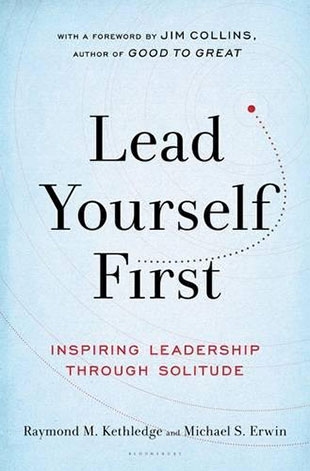"Embrace hard thinking. Evenduring time alone, it is easy for a leader to fool himself and everyone else into believing that he is doing substantive work when in fact he is merely reviewing superficial correspondence or performing functions that are almost ministerial. A leader should use solitude to identify his highest-value functions and then to do them. Among the most valuable functions a leader can perform is hard thinking about complex problems: identifying the problem precisely, making the premises of his thought explicit, and then examining each link in his logical chain – ideally all done on a notepad. There are fewer distractions that way.
"Sometimes complex problems concern the organization as a whole. A leader who has not thought hard about those problems will favor off-the-rack solutions that are the leadership equivalent of the latest diet fad. Or the leader will offer only vague guidance to subordinates – 'reassess this from a different angle,' or 'this needs to be buttoned up more' – because the leader himself lacks a clear idea of what he is looking for. A leader who embraces hard thinking can lead himself, and then others, through the process of finding effective solutions.
"Other problems arise from the complex dynamics of interpersonal relationships. Solitude allows a leader to think carefully about what a particular subordinate needs, what that person might be worried about, or where the leader himself has fallen short in their relationship. A leader who reflects on his subordinates' well-being will enhance their effectiveness and earn their loyalty.
Identify your first principles and stay connected with them. A leader's first principles are the wellspring of all the benefits that solitude provides: clarity, creativity, emotional balance, and moral courage. A leader out of touch with his first principles will eventually run short of all these things. With a lack of direction internally, he will become directed externally. He will find himself governed by optics. He will have an uneasy awareness of a gap between what he thinks he believes and what he in fact chooses to do. The gap itself will reveal a lack of clarity in his thinking. And when others see the gap – when they say he is phony or hypocritical, and discount his leadership accordingly – he will have nothing to draw upon inside.
"An authentic leader finds herself on different ground altogether. A leader who identifies her first principles and then periodically measures her actions against them is likely to act in accordance with them. That kind of leadership is inner-directed; and an inner-directed leader is unlikely to be diverted by moral criticism or praise. That is not to say a leader should be closed-minded: an effective leader will consider criticism on its merits, and when the critics have a point, she will act upon it. For the leader who has reflected deeply on her first principles, however, the criticism or praise that ultimately matters most is her own.
"It is only this kind of leader – clear, balanced, courageous – who truly leads.
"Find a higher purpose for your leadership, and share it with your followers. The most inspiring leaders are ones who find some transcendent meaning in the enterprise they lead. That meaning might spring from shared first principles, as it could for any organization that shares them in earnest. It might spring from a sense of shared injustice, or the realization that suffering confers dignity, or an awareness that honest labor does as well. Or it might spring from the devotion that a group's members share for one another. A transcendent meaning is one that by definition stands apart from the specific goals at hand. To find it, therefore, usually requires reflection.
"The leaders who do find it are the ones we honor most."
